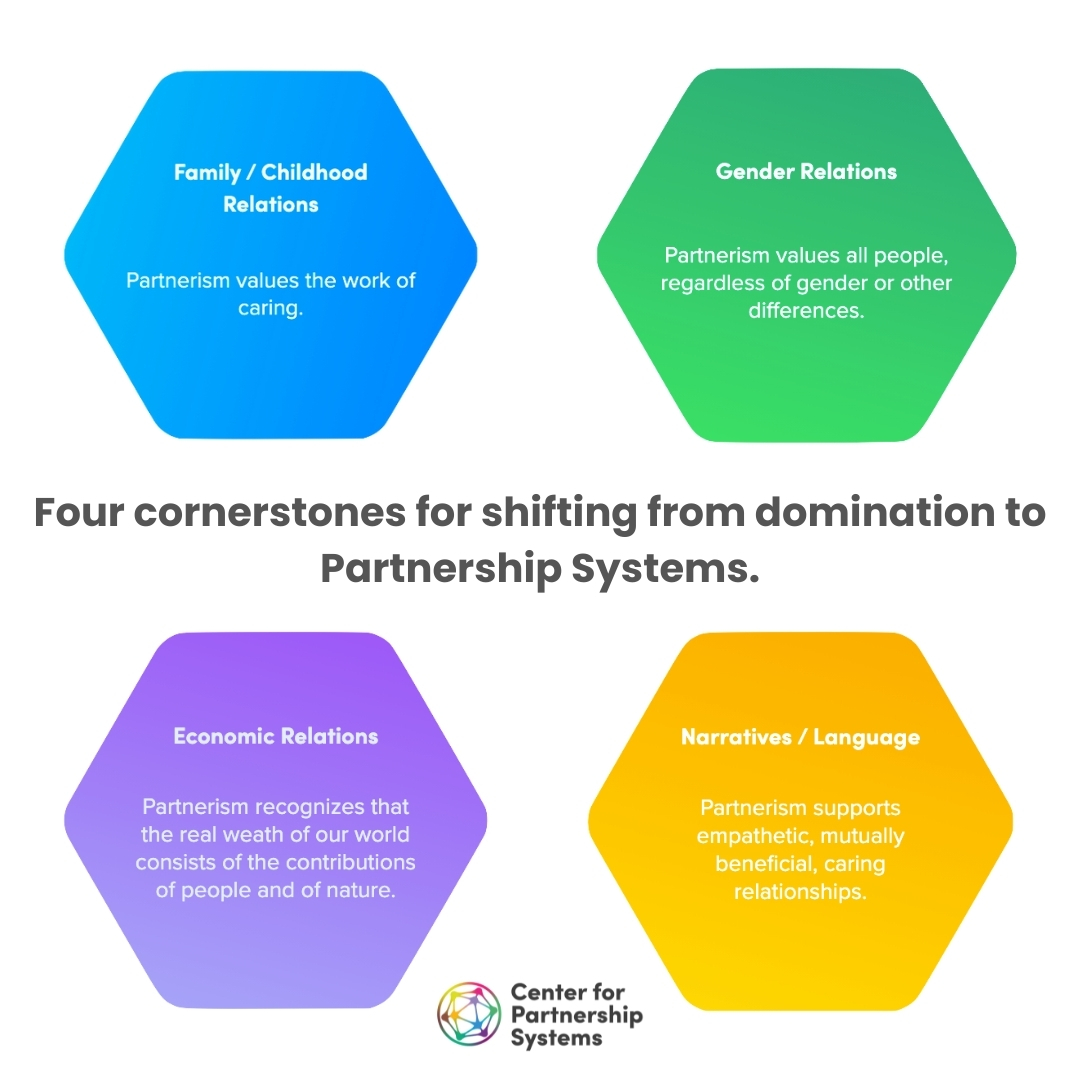Riane Eisler - A life’s work that inspired a movement.

Riane Eisler has devoted her life to introducing a new story about human nature and human possibilities, a story that has transformed organizations, policies, and people worldwide. Dr.Eisler pioneered the extension of human rights theory and action to the majority of humanity: women and children. Her multidisciplinary research and scholarship provide a roadmap for all of us who seek to build a more equitable, sustainable, and less violent world based on partnership rather than domination.
Dr. Eisler’s passion for this work is rooted in her early experiences as a child in Nazi-occupied Austria, and then as a refugee living in the industrial slums of Havana, Cuba. These profound experiences drove her to ask big questions: “Why, when we humans have such a great capacity for caring, consciousness, and creativity, has there been so much cruelty, insensitivity, and destructiveness? Has it ever been different, and can it be different again?”
Her search for answers took her into a deep, multidisciplinary study of human history, and her book The Chalice and the Blade (now in 57 US printings and 27 foreign editions) is based on a re-reading of thirty thousand years of human culture. Eisler showed that for millennia human societies were structured as what she called “Partnership Systems.” While not ideal, these were societies in which our capacity to give, nurture, and sustain life was celebrated and revered as divine; women and men shared power; and a spirit of mutual care and responsibility prevailed. The existence of this ancient social configuration, long before the systems of domination which followed, help us understand that we don’t have to accept conquest, violence, and abuse as “just human nature.”
Eisler’s many subsequent books – from Sacred Pleasure, The Power of Partnership, and Tomorrow’s Children to The Real Wealth of Nations and Nurturing Our Humanity—examine different facets of human experience, from intimate relationships to education, healthcare, economics, and human neurobiology, through the new conceptual lens of the Partnership-domination social scale. All her work illuminates the central theme of why we must, to survive and thrive in the 21st century, again build Partnership Systems organized around life-sustaining values, supporting the expression of our innate human empathy, caring, and awareness of interconnection with each other and with nature.
Eisler is the recipient of the Distinguished Peace Leadership Award, earlier given to the Dalai Lama, and other national and international awards for her ground-breaking contributions as a systems scientist, futurist, attorney, and historian. Eisler’s pioneering work offers new perspectives for constructing less violent and more egalitarian, gender-balanced, and sustainable future societies. Eisler is President of the Center for Partnership Systems, Editor in Chief of the Interdisciplinary Journal of Partnership Studies, and distinguished professor at Meridian University, which offers PhD and Masters degrees based on Eisler’s Partnership-domination social scale.

Partnership Systems and the Partnerism movement.
Partnership and domination systems are holistic categories that no longer marginalize our formative family and gender relations, as our conventional social categories (right/left, religious/secular, eastern/western, capitalist/socialist, etc.) do. They pay particular attention to findings from neuroscience showing the impact of what children experience and observe on brain development, and therefore on how we think, feel, and act, including how we vote.
There has been some movement toward Partnership systems, but the focus has been on dismantling the top of the domination pyramid: politics and economics as conventionally defined. This has left in place the foundations on which domination systems have rebuilt themselves in regression after regression.
Eisler’s work reveals four essential and interconnected cornerstones for shifting away from the legacy of domination that we’ve inherited and again build the Partnership Systems needed to support human thriving and the survival of our planet:
- Family and Childhood Relations
- Gender Relations
- Economic Relations
- Narratives and Language
The Partnerism Movement is an initiative of the Center for Partnership Systems to make Partnership Systems mainstream, starting with shifting to a caring economics of Partnerism: a socio-economic system that values and rewards caring for one another, nature, and our collective future. We invite you to join the movement!
Riane Eisler’s Domination/Partnership Social Scale.

Domination
Partnership
Family, Economic, and Social Structure
An authoritarian structure of ranking and hierarchies of domination in family, economics, and society, so children grow up in authoritarian, punitive, male-dominated families where they observe and experience inequity as the norm.
Democratic structure and hierarchies of actualization that empower rather than disempower. Caring is economically valued. Egalitarian and equitable adult relations are the norm. Parenting is not authoritarian but authoritative and non-violent.
Fear, Abuse, and Violence
Gender Roles and Relations
Narratives and Language

Making the shift to Partnership Systems
We all have a role in shifting away from traditions of domination and implementing new systems that foster equity, inclusion, mutual respect, and mutual responsibility. Following the four key components of the Partnership/domination scale, here are actions that we can all support and help to implement.
- Shift from GDP to the Social Wealth Index (SWI), a new measure of economic productivity being developed by the Center for Partnership Systems that focuses on quality-of-life, human development, and environmental sustainability. Find out more.
- Reward pro-social, pro-environmental policies and practices with tax breaks and other benefits and penalize irresponsible ones.
- Invest in parents and care givers; invest in early childhood. Find out more.


- Unlink masculinity from domination, violence, and control and unlink femininity from subordination, obedience, and servitude.
- Unite to stop violence against girls and women and to protect the LGBTQ community.
- Elect partnership-oriented women and men from diverse racial and ethnic groups who support caring and empathic policies, including family planning and reproductive choice.
- Build cultures of mutual respect and mutual responsibility.
- Recognize that women’s rights are human rights. Find out more.
- Invest in trauma-sensitive schools and workplaces Find out more.


- Shift away from false stories of “human nature” as fundamentally oriented to violence and competition; elevate research and narratives that demonstrate that human beings of all genders have an enormous capacity for empathy and caring.
- Spread the story that domination systems are not inevitable or divinely ordained – they are a 6000+ year experiment that has led to unnecessary human suffering and environmental destruction.
- Create media that models partnership morality and ethics. Nurture the spiritual courage required to make partnership a way of life. Find out more.
Partnership Language Lexicon
We invite you to explore the linguistics of Partnership Systems by becoming familiar with the definitions and uses of the following terms.
Partnership Systems and Domination Systems:
Riane Eisler’s whole-system research reveals that underlying the great diversity of human culture are two basic models of society: domination systems and Partnership Systems. The core configurations of these two systems are like the operating system of a culture; they shape all relationships, from families, education and religion to politics, economics, and how we relate to nature.
Domination systems have superior/inferior relationships and view power as “power over”. Fear and force impose and maintain rankings of man over man, man over woman, parents over children, race over race, religion over religion, all the way to humans over the earth.
Partnership Systems have egalitarian relationships and view power as “power with” and “power to” (creative power). Fear and force are not required to maintain superior/inferior rankings, and relationships are marked by mutual respect, mutual accountability, caring, and awareness of interconnection.
In gender terms, domination systems start with the ranking of one half of humanity over the other, as in patriarchy or matriarchy. By contrast, in Partnership Systems social relations are primarily based on the principle of linking rather than ranking. Diversity is not equated with either inferiority or superiority. There are hierarchies, but they are not hierarchies of domination but rather empowering hierarchies of actualization where power is used to empower rather than disempower.
We have been taught that domination systems are natural and inevitable. Drawing from multidisciplinary evidence, Eisler’s research shows that for millennia human cultures oriented toward Partnership Systems.
At our current level of technological development, domination systems not only continue to cause severe and unnecessary human suffering, but could end life on Earth for humanity and many other species. We must shift to Partnership Systems to sustain life on our planet and ensure all people thrive.
Patriarchy/Matriarchy and Partnership
Eisler’s work reveals that the opposite of patriarchy is not, as we have been taught, matriarchy. In other words, if men did not dominate women, women must have dominated men. In reality, patriarchy’s opposite is Partnership, a system in which neither gender rules over the other and diversity is valued.
Partnership
Partnerism
Partnerism is a term for the economic system that supports Partnership-oriented societies. First coined by Riane Eisler in The Real Wealth of Nations, the term Partnerism refers to an economic system that, unlike Capitalism and Socialism, recognizes the economic value of care and adequately rewards it in both the market and nonmarket sectors.
Like Capitalism and Socialism, Partnerism is an economic ideology that promotes a set of values, assumptions, and beliefs. As an ideology, Partnerism promotes and rewards caring for one another, nature, and our collective future.
The Partnerism Movement
The Partnerism Movement is a global social movement to mainstream the idea of partnership system design, starting with a caring economics of Partnerism, an economic system that, unlike Capitalism and Socialism, values and rewards caring for one another, nature, and our collective future.
Inspired by Riane Eisler’s work, the movement to mainstream Partnerism as an alternative to Domination economics started in 2019 in response to Eisler’s keynote at the Bretton Woods 75 conference. The Partnerism Movement builds on the Center for Partnership System’s Caring Economy Campaign of 2008 – 2017.
Hierarchies of Actualization
Eisler coined the term “Hierarchies of Actualization” to describe how hierarchies are constructed in Partnership Systems. In Hierarchies of Actualization, parents, managers, leaders and others in positions of authority seek to uplift and empower others.
In hierarchies of domination, rigid rankings are used to control others and keep people deemed inferior “in their place".
The Domination/Partnership Social Scale (also called the continuum)
No human society is purely a domination system or a Partnership System; all are somewhere on the spectrum between these two possibilities. Our task today is to move our institutions, policies, values, and practices further in the direction of Partnership.

The Four Cornerstones
Eisler’s research reveals four interactive levers for shifting away from Domination Systems toward Partnership Systems: Gender relations, Childhood relations, Economic relations, and Language/Narratives.

Eisler’s scholarship directs us to focus our efforts in these four areas as foundational to build Partnership Systems.
Building a Caring Democracy: 4 Cornerstones for an Integrated Progressive Agenda
Cultural Transformation Theory
Conventional approaches assumed that social change is linear or one-directional (as in the idea of a gradual progression from “barbarism” to “civilization”). In the last hundred years, new theories contradict this view. Based on evidence from disciplines ranging from archaeology and anthropology to linguistics and DNA studies, a new more accurate picture of human cultures through time and place is emerging.
Riane Eisler’s theory on cultural evolution is sometimes referred to as Cultural Transformation Theory. Drawing from new approaches such as self-organizing systems, non-linear dynamics, and chaos theories, it is based on new understandings of how complex living systems maintain themselves and how they can undergo transformative change during periods of significant disequilibrium.
Technological and social evolution tend to become more complex, but the direction of cultural evolution depends on whether we have a Partnership or a domination oriented social structure.
In other words, new technologies are destabilizing to old patterns, but do not by themselves determine the direction of cultural change. If you change the cultural values, assumptions, and structures that govern the development and use of technology, you change the impact of those technologies.
Eisler’s research shows that whole-systems change is fundamentally driven by shifts in the configuration of our human-to-human and human-to-Earth relationships, including our families, our language and categories for thinking, as well as our core values, beliefs, and the stories we learn about “human nature.” This research differs from earlier approaches in significant ways. It looks at the whole of our history, including prehistory, and at the whole of our social systems rather than marginalizing or ignoring the majority of humanity, women and children. It takes into account findings from neuroscience showing that what children experience or observe shapes the development of our human brains, and hence how we think, feel, and act – including how we vote. It is multidisciplinary, and includes new disciplines like gender studies, making it possible to see connections that have been invisible.
Partnership Language
How we use language is key in the shift to Partnership Systems. Domination-based words and phrases have been built in to our everyday use of the English language, and influence the way we perceive the world. The examples below are a sampling of the many phrases that can evolve from a context of domination to Partnership in our everyday use of language.
- Kill two birds with one stone → Hatch two birds with one egg
- I really killed it/crushed it/nailed it → I really brought it to life
- I will whip that into shape → I will concentrate on this project
- Bullet points → Itemized list
- Mankind → Humankind
Partnership Language and Vocabulary We invite you to share any other examples of Partnership Language and Vocabulary with us that aren't on the list. Please let us know here.

